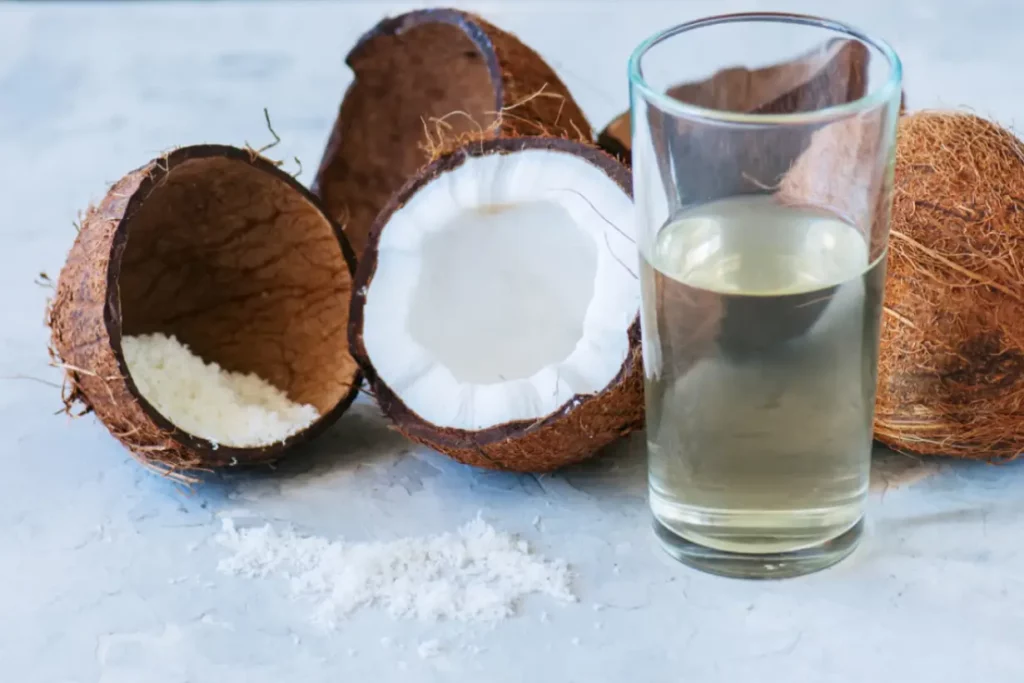Coconut water is the juice of a young coconut, making it a type of fruit juice.
As a drink, coconut water is often mentioned in health circles for providing a range of benefits. However, as with any popular food or drink, the messaging around its benefits can sometimes be overhyped.
So, are the potential benefits of coconut water significant enough reasons to drink it?
This article presents four benefits of coconut water and explores its full nutritional composition.
Table of contents
Benefits of Coconut Water

Here are some of the benefits that coconut water can provide, whether based on its nutritional properties or findings from scientific studies.
1. High In Potassium—Potential Benefits For Blood Pressure
One of the main nutritional benefits of coconut water is its potassium content. A 245-gram cup serving of coconut water contains 404 mg of potassium, which is equal to 9% of the daily value for the mineral (1, 2).
Potassium is an electrolyte mineral with many vital functions in the body. Among these, it is particularly known for its role in regulating blood pressure and its ability to lower blood pressure when consumed in sufficient amounts (3, 4).
In this regard, it is well established that a higher intake of potassium significantly reduces blood pressure (5, 6).
Key point: A single cup of coconut water is a simple way to get nearly 10% of daily potassium needs.
2. May Have Hydration Benefits
Coconut water is approximately 95% water by weight, but it also contains the electrolytes calcium, magnesium, phosphorus, potassium, and sodium (1).
Electrolytes help maintain water balance (7). In other words, the combination of water and electrolyes may potentially have benefits for hydration.
On the cautious side, it is worth noting that aside from potassium, the electrolytes in coconut water are present only in small quantities.
Additionally, a systematic review of controlled trials and observational studies examined the effectiveness of coconut water compared to plain drinking water as a treatment for exercise-associated dehydration. This review found no differences in hydration status between the two drinks (8).
However, the authors noted that the evidence is of “very low certainty,” due to factors such as a small sample size in the study.
A 2017 randomized controlled trial also demonstrated that coconut water did not improve markers of hydration compared to water during sub-maximal exercise (9).
Key point: Based on the existing evidence, coconut water may potentially offer hydration benefits, but these benefits are unlikely to be significantly greater than those provided by regular water.
3. A Good Source of Vitamin C
A perhaps lesser-known fact about coconut water is that it contains vitamin C. Each 245-gram cup serving of coconut water provides 24.3 mg of vitamin C, which accounts for 27% of the daily value (90 mg) for the nutrient (1, 2).
Vitamin C is an essential vitamin that plays an important role in protecting the body against free radicals—unstable molecules that can cause oxidative stress and damage cells (10).
Key point: While other juice drinks may offer a higher vitamin C content, coconut water still provides a relatively high level of this vitamin.
4. May Have Benefits For Gut Health
Aside from its vitamin and mineral content, coconut water contains a range of bioactive compounds.
These include CnAMP1, CnAMP2, and CnAMP3—peptides with antimicrobial properties. It is thought that these peptides may have health benefits due to their activity in the gut, ranging from interacting with bacteria to being absorbed by intestinal cells (11).
Potentially due to these interactions in the gut, along with its essential nutrient content, coconut water may offer benefits for gut health.
In a 2024 randomized controlled trial involving 95 participants, coconut water was more effective than a placebo (coconut-flavored water) in inducing remission of mild to moderate ulcerative colitis (12).
It should be noted that both the coconut water intervention and the placebo were combined with standard medical therapy (SMT).
In other words, coconut water provided additional benefits when used as an adjunct to SMT, not as a replacement for it.
Key point: Research has demonstrated that when used as an adjunct to standard medical therapy, coconut water may help improve remission in cases of mild to moderate ulcerative colitis.
Other Recent Scientific Research
In recent times, two other randomized trials looked at the potential health and performance effects of coconut water.
Coconut Water As a Sports Drink
A 2023 randomized crossover trial compared the effects of coconut water and a commercial sports drink on performance (13).
The study involved 19 experienced cyclists. They cycled steadily for 90 minutes while drinking either coconut water or the commercial sports drink. After cycling at a steady pace, the participants completed a 20-kilometre time trial.
Both drinks were isocaloric (containing the same number of calories). Physiological markers (blood sugar, sweat loss, heart rate) were measured.
However, there were no significant differences in physiological markers or time trial performance between the two groups.
Therefore, this study shows that coconut water had a similar effect to a sports drink on cycling performance. However, it was only a small trial and was compared to just one commercial sports drink.
Further research is necessary to provide greater clarity on how coconut water may perform compared to commercial sports drinks for exercise performance.
Coconut Water and Dysmenorrhea
A 2023 randomized controlled trial compared the effects of coconut water, dark chocolate, and Ibuprofen on reducing dysmenorrhea (pain during menstruation).
Forty-five women were assigned to receive one of the following on the first day of menstruation:
- 330 ml of coconut water
- 35 grams of 70% dark chocolate
- 400 mg Ibuprofen
Ibuprofen was the most effective intervention for reducing menstrual pain intensity, followed by dark chocolate.
Coconut water showed significantly lower effectiveness.
Key point: Recent research has explored the potential of coconut water for improving sports performance and reducing period pain. However, there is a lack of evidence for benefits in this regard.
The Nutritional Profile of Coconut Water
Let’s now take a look at the complete nutritional profile for coconut water.
The following tables present the nutritional values for coconut water per 245-gram cup serving, with nutritional data sourced from the USDA’s FoodData Central database (1).
Calories and Macronutrients
| Nutrient | Amount | % Daily Value |
|---|---|---|
| Calories | 44 kcal | |
| Carbohydrates | 10.4 g | 3.8% |
| Fiber | 0 g | 0% |
| Sugars | 9.6 g | |
| Fat | 0 g | 0% |
| Saturated fat | 0 g | 0% |
| Monounsaturated fat | 0 g | |
| Polyunsaturated fat | 0 g | |
| Protein | 0.54 g | 1% |
| Cholesterol | 0 mg | 0% |
As shown in the table, coconut water is relatively low in calories and is primarily a source of carbohydrates.
However, it does not have the same fiber content as more complete coconut products such as coconut flour and coconut milk.
Vitamins
| Vitamin | Amount | % Daily Value |
|---|---|---|
| Choline | 0 mg | 0% |
| Folate, DFE | 0 mcg | 0% |
| Thiamin (B1) | 0.07 mg | 6% |
| Riboflavin (B2) | 0 mg | 0% |
| Niacin (B3) | 0 mg | 0% |
| Vitamin B6 | 0 mg | 0% |
| Vitamin B12 | 0 mcg | 0% |
| Vitamin A, RAE | 0 mcg | 0% |
| Vitamin C | 24.3 mg | 27% |
| Vitamin D | 0 mcg | 0% |
| Vitamin E | 0 mg | 0% |
| Vitamin K | 0 mcg | 0% |
Minerals
| Mineral | Amount | % Daily Value |
|---|---|---|
| Calcium | 17.2 mg | 1% |
| Copper | 0.02 mg | 2% |
| Iron | 0.07 mg | <1% |
| Magnesium | 14.7 mg | 4% |
| Manganese | 0.54 mg | 23% |
| Phosphorus | 12.2 mg | 1% |
| Potassium | 404 mg | 9% |
| Selenium | 0 mcg | 0% |
| Sodium | 63.7 mg | 3% |
| Zinc | 0.05 mg | <1% |
Key point: Coconut water is a source of carbohydrates and provides moderate to high amounts of manganese, potassium, and vitamin C.
Is Coconut Water a Healthy Choice?
Coconut water is a refreshing drink and a good source of potassium, vitamin C, and manganese.
It may potentially have benefits for hydration and sports performance. However, the currently available evidence does not suggest these benefits are significantly greater than those provided by regular water.
In summary, coconut water is a relatively low-calorie drink that provides essential nutrients and peptides with potential benefits.
For those who enjoy it, coconut water may be a good choice for hydration—even if its benefits in this area aren’t significant, it still offers a good range of nutrients.








